论文对象招募
📌 实验内容(纯线下校园里进行)
- 配对写作(与一位小伙伴合作完成一篇短篇150字左右的英文作文)
- 完成一个小问卷(关于写作期间的情绪感受)
👩🎓 招募对象:
- 母语为中文,第一外语为英文
- 年龄 18–55 岁,本硕博在读生
🗓 时间安排:
- 可根据你的空闲时间预约
💰实验报酬:
- 20磅的优惠券或者是200字论文润色服务

⚠️ 实验说明:
- 参与完全自愿,可随时退出
- 实验数据仅用于学术研究,严格保密
📩 报名方式:
- 有兴趣的同学扫码进群
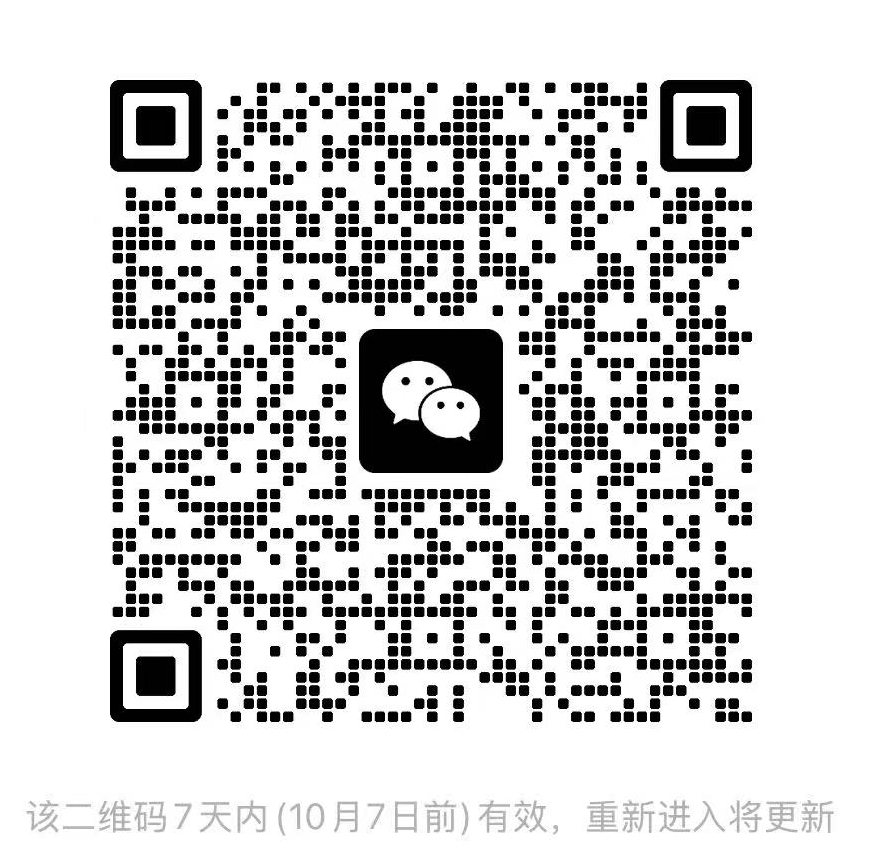

📌 实验内容(纯线下校园里进行)
👩🎓 招募对象:
🗓 时间安排:
💰实验报酬:

⚠️ 实验说明:
📩 报名方式:

Following the success of the inaugural QUB Diversity, Equality, Inclusion and Belonging (DEIB) Forum in March 2025, the upcoming event will centre on the theme: “Sense of Belonging and Microaggressions among International Students”, with a particular focus on the lived experiences of Chinese and Indian students at Queen’s. Colleagues are warmly welcome to attend this forum, as below:
Date: Tuesday 24 June 2025
Time: 13:00 – 15:30
Venue: The Auditorium, McClay Library
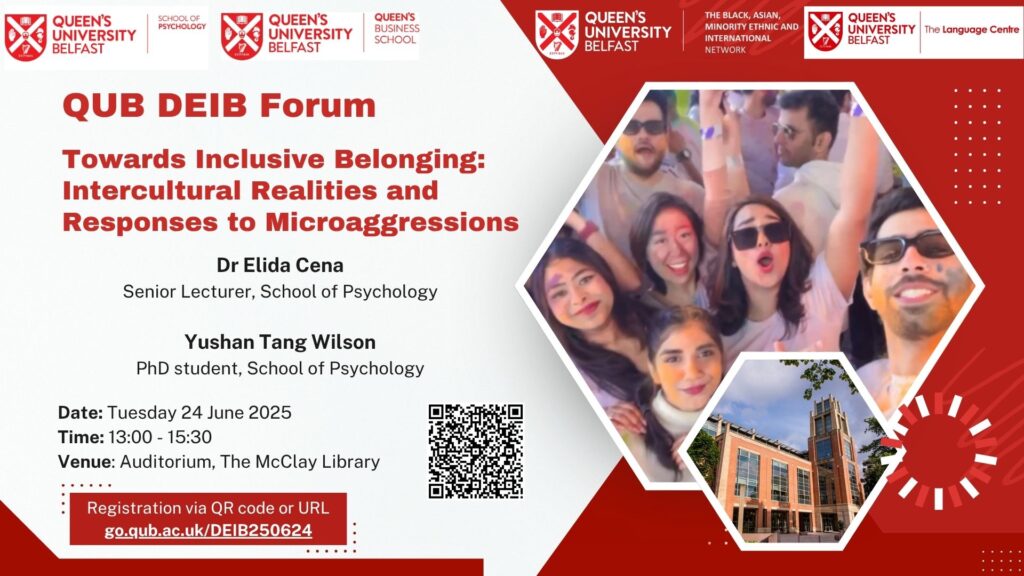
Speakers:
A panel of academic, professional colleagues and student representatives will further explore both the conceptual dimensions and the practical steps needed to enhance inclusion, foster belonging, and address microaggressions within our diverse university community.
Programme:
Places are limited to max. 40 due to room capacity and we have the first-come, first-served policy. The registration form will be closed once places are taken, or by 5 pm, Friday 20th May the latest.
Related reading:
How to International – My Intercultural Journey as A Global Citizen
何以国际化 —— 我的全球公民跨文化之旅
Friday 13th June 2025
13:00-14:00
Auditorium, The McClay Library
Teams: invite to be sent after registration
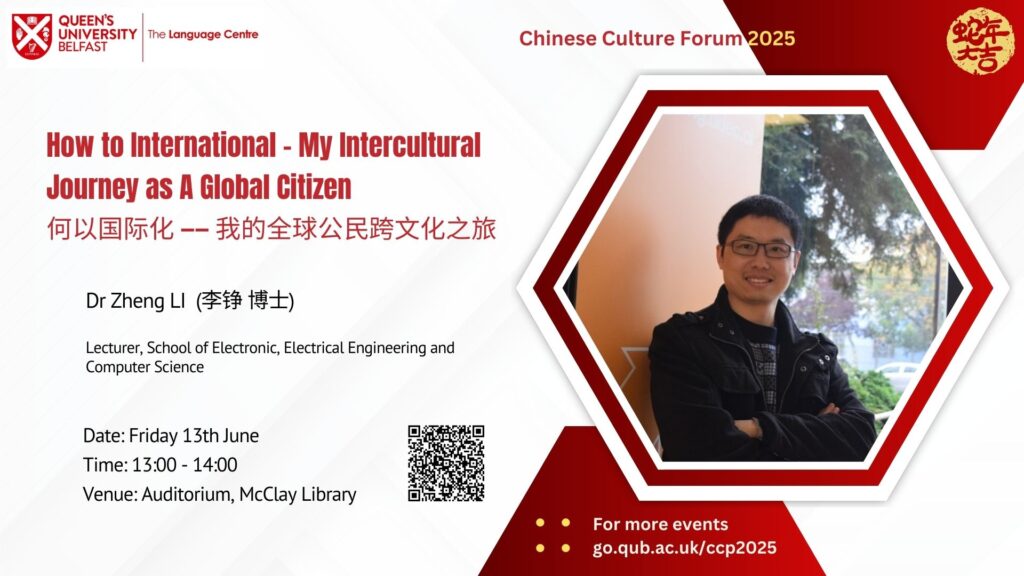
Speaker:
Dr Zheng LI (李铮) is lecturer in School of Electronic, Electrical Engineering and Computer Science
Find Zheng’s academic profile
Outline:
Inspired by Jimmy O. Yang’s How to American, I’d like to begin by sharing my journey as a global citizen from China to Australia, Sweden, Chile, and now the UK. Through these diverse experiences, I’ve learned not just how to adapt, but how to thrive across cultures. In particular, I will share some personal reflections on how to survive and grow internationally. For me, it comes down to three key approaches – understanding, respecting and enjoying. Each culture offers something new to learn, appreciate, and celebrate. It is in that mindset that we truly become global citizens.
Pictures
In her first episode, Liu Ningning introduced her life with dance at Queen’s. In the second half, she continues to share with us how she has done so far to build up confidence in academic growth. For more information on her research interest, please read the School of Law webpage.
Finding My Voice: From Queen’s Competition to Cambridge Conversations
As a first-year PhD student in Law at Queen’s, one of my goals has always been to go beyond my thesis — to challenge myself, engage with others, and grow as both a scholar and a communicator. This spring, I took two major steps toward that goal: I participated in the Three-Minute Thesis (3MT) Competition hosted by the Faculty of Arts, Humanities and Social Sciences (AHSS), and I attended my first academic conference in the UK — the Cambridge International Law Journal’s Annual Conference.
“Three Minutes, One Slide”
The 3MT Competition took place on 20 March 2025 and brought together PhD researchers from across AHSS Schools to do something both daunting and exciting: present their entire PhD research in just three minutes, using only one static slide, to a non-specialist audience.
It was my first academic competition at Queen’s, my first presentation to a public audience beyond my supervisors and peers, my first time competing in English — and, frankly, my first time doing anything like this. To make things even more challenging, I wasn’t feeling my best physically that day. But I reminded myself: this wasn’t just about competing — it was about learning. It was a valuable opportunity for practice, feedback, and growth — especially ahead of my differentiation review and future conference presentations. I wanted to hear comments from people outside my discipline. I wanted to get my research out there, early.
And I did.
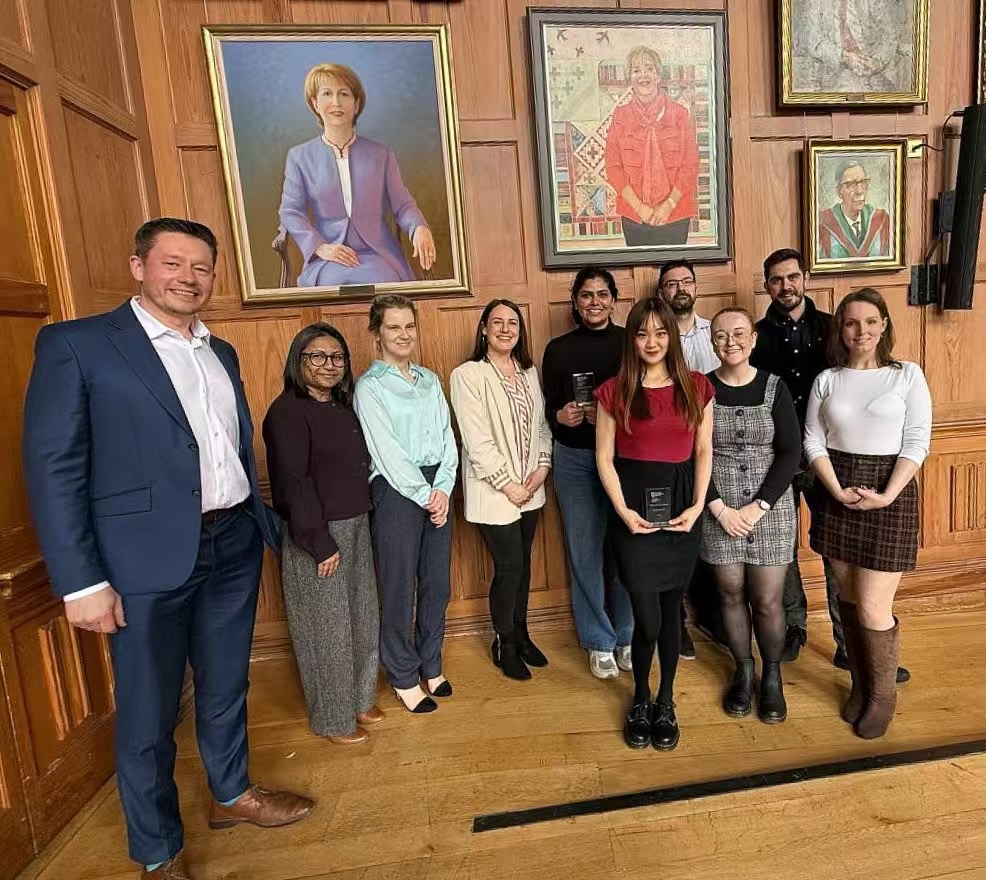
To my surprise, I was awarded Runner-Up. I was the only Chinese and East Asian student, the only first-year PhD among the winners, and I received incredibly warm, encouraging feedback from both judges and audience members. But what meant the most was realising that my voice could be heard — and appreciated — even in a room full of native speakers.
More importantly, I grew from the experience. The challenge of condensing a complex PhD project into a strict three-minute format forced me to reflect on what really matters in my research — what’s essential, what’s meaningful, and how to connect with people unfamiliar with my field. The process sharpened not only my ideas but also my sense of purpose.
As a non-native English speaker, I know how intimidating it can be to speak publicly. Many Chinese students worry about accents, grammar, or not “sounding perfect.” But I’ve learned that presentation is not just about flawless English — it’s about clarity, confidence, and connection. Everyone has an accent. What matters is whether your audience understands your message and feels your intention.
The competition also gave me the chance to listen and learn from others. I was inspired by the diversity of topics, styles, and approaches. From research focus to methodology to presentation techniques, I came away with insights that will help shape my academic journey.
I would encourage my peers to take part in competitions, workshops, conferences, and other events. Step up, speak out — not necessary to win, but to grow.
From Queen’s to Cambridge
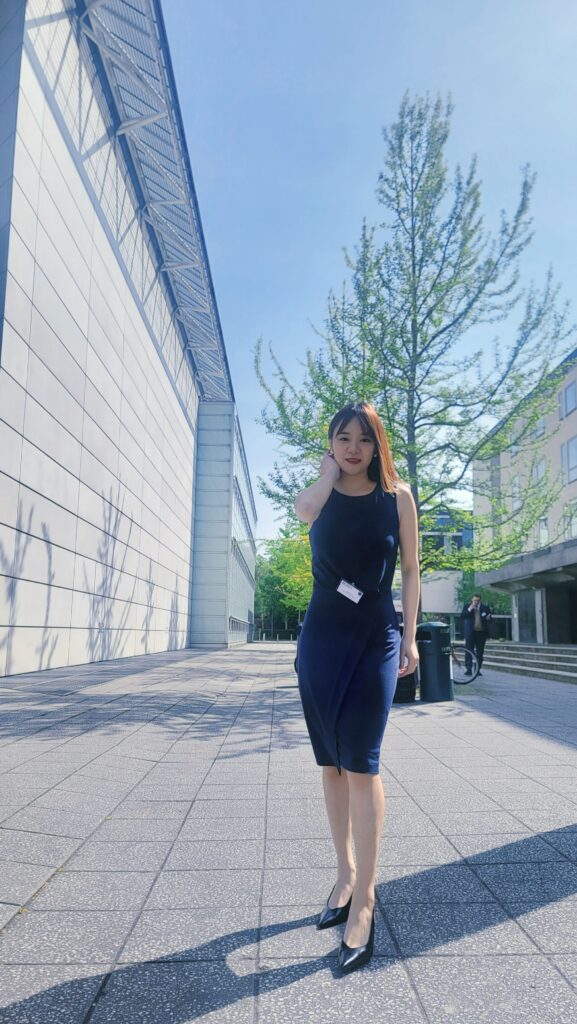
Building on that momentum, I travelled to Cambridge in late April to attend the 14th Annual Conference of the Cambridge International Law Journal, themed Navigating a Multipolar World: Challenges to the Post-WWII Status Quo of International Law. This was my first academic conference in the UK — and I attended not to present (yet!), but to observe, learn, and take the temperature ahead of my upcoming presentation at the Warwick Law Colloquium in June.
My academic background — in German asylum law for my undergraduate thesis, and international organisation law for my master’s — has always drawn me to global legal issues.
The Cambridge conference gave me a front-row seat to current conversations on climate justice, international criminal law, cyber governance, and the future of human rights. Attending this conference — listening to panels, keynote speeches, and hallway conversations — reminded me why I chose to pursue a PhD. It also gave me ideas for positioning my own research within the broader context of global legal developments.
Both experiences have inspired me to grow — not only as a researcher, but also as a communicator and an engaged member of the academic community. I’ve learned that making an impact isn’t about being perfect; it’s about showing up, being open to learning, and having the courage to share your thoughts. Often, that first step is all it takes to start something meaningful.
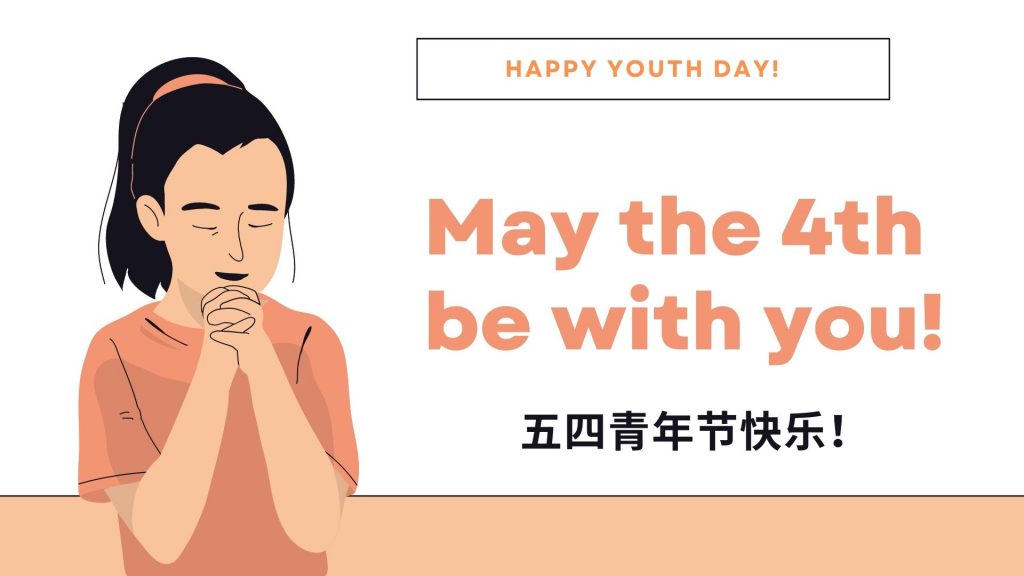
International Dance Day, celebrated globally on the 29th of April every year since 1982, is an annual celebration of how dancing positively impacts our lives.
In 1982 the Dance Committee of ITI founded International Dance Day to be celebrated every year on the 29th April, the birthday of Jean-Georges Noverre (1727-1810), creator of modern ballet. The intention of the International Dance Day Message is to celebrate dance, revel in the universality of this art form, cross all political, cultural and ethnic barriers, and bring people together with a common language – dance.
1982年,国际戏剧协会ITI旗下舞蹈委员会成立国际舞蹈日这一艺术节日,日期定在每年的4月29日,这一天也是现代芭蕾之父Jean-Georges Noverre (1727-1810)的诞辰日。 每年的国际舞蹈日都会有一位杰出的舞蹈界人士撰写献辞。献辞的目的在于庆祝舞蹈这一能够跨越政治、文化、种族障碍,能够将人们聚在一起的全球共通的艺术形式。
Internationaldanceday.org
On this special day, we are pleased to invite Liu Ningning (刘宁宁), a first-year PhD student in Law at Queen’s, to share her life with dancing, in particular, her experience with the QUB Dance Club.

Being part of the QUB Dance team has been one of the best decisions I have made since arriving in Belfast. It reminded me that pursuing academic excellence and personal passions can go hand-in-hand, and that life at Queen’s is full of wonderful opportunities to connect, challenge yourself, and grow.
When I began my PhD journey at Queen’s last September, I was determined not only to immerse myself in academic life but also to contribute actively to the vibrant community here. As a first-year PhD student at the School of Law under a DfE scholarship, I was honoured to be elected as the PhD Student Representative on the Doctoral Studies Committee. Yet another important and unexpected chapter unfolded beyond the library and lecture halls — through dance.
Ningning Liu, a commercial lawyer with a Juris Master degree from Fudan University and a BA in German Language and Literature from Tongji University, has been awarded the prestigious AHSS International DfE Award. Ningning will begin her PhD at the School of Law, focusing on women’s rights to political participation in modern China — specifically in Shanghai from the 1840s to the 1940s — and seeks to draw lessons for women’s empowerment today. Her research addresses critical questions about the role of women in shaping the legislative, political, and social landscapes in modern Shanghai, and the lasting impact of their political engagement on China and beyond. (Source: QUB School of Law)
After successfully passing a competitive audition, I became an active member of the QUB Dance Club, being the only international, Asian, and PhD student among a team primarily composed of undergraduates. It since has been an unforgettable and transformative experience for me.
Throughout the year, alongside my academic progress, I devoted many evenings and weekends to rehearsals, participated in major fundraising events such as So You Think You Can Dance and QUB Strictly Come Dancing (where we raised over £1,200 for charity in total!), and proudly represented Queen’s at national dance competitions in Leeds and Liverpool. One of the highlights was when our team won 2nd place in the Advanced Hip-Hop category — a moment that filled me with pride, not just for myself, but for everyone who had worked tirelessly alongside me.
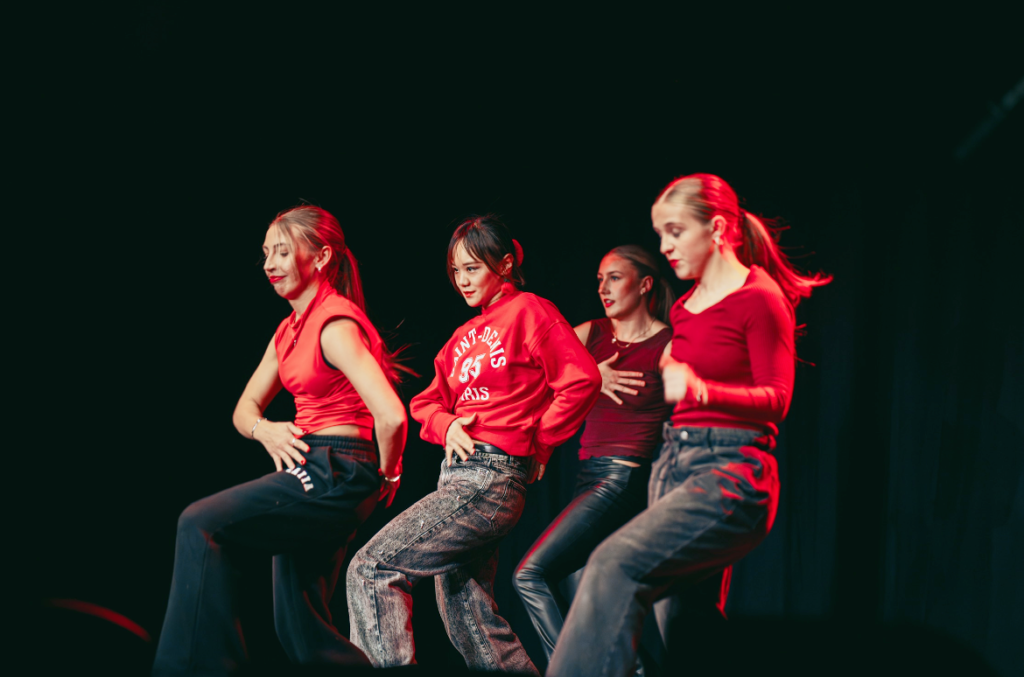
Coming from Shanghai, I have been dancing hip-hop for around five years. For me, dance is not just a hobby — it is a part of who I am. I was thrilled to find that even during my intense PhD life, I could continue this passion at Queen’s. In fact, dance has made me more energetic, better at time management, and even more focused on my research. My supervisors have been incredibly supportive, and I am deeply grateful for their encouragement.
Of course, this journey was not without its challenges. As the only international and PhD member of the team, I initially found it demanding to adjust to the fast-paced, competitive environment dominated by undergraduates. I needed to develop greater flexibility in my approach to teamwork, quickly learn new choreography, and adapt to the group’s dynamic performance style. I actively sought feedback from more experienced teammates, spent additional hours practicing, and carefully analysed recorded performances to identify areas for improvement. Gradually, I adapted my style to align more closely with the team’s approach while also introducing elements of my own background in dance to add creative variety. These experiences not only strengthened my ability to think flexibly and critically to assess my progress but also boosted my confidence in tackling new challenges.
One of the most rewarding aspects of this journey has been the friendships I built within the team. Regardless of our different disciplines and cultural backgrounds, we have connected well through our shared passion for dance. I am truly inspired by the team’s spirit, commitment, and the way everyone supports each other both on and off the stage. Their high level of organisation and drive constantly motivate me to push myself, improve, and contribute more.
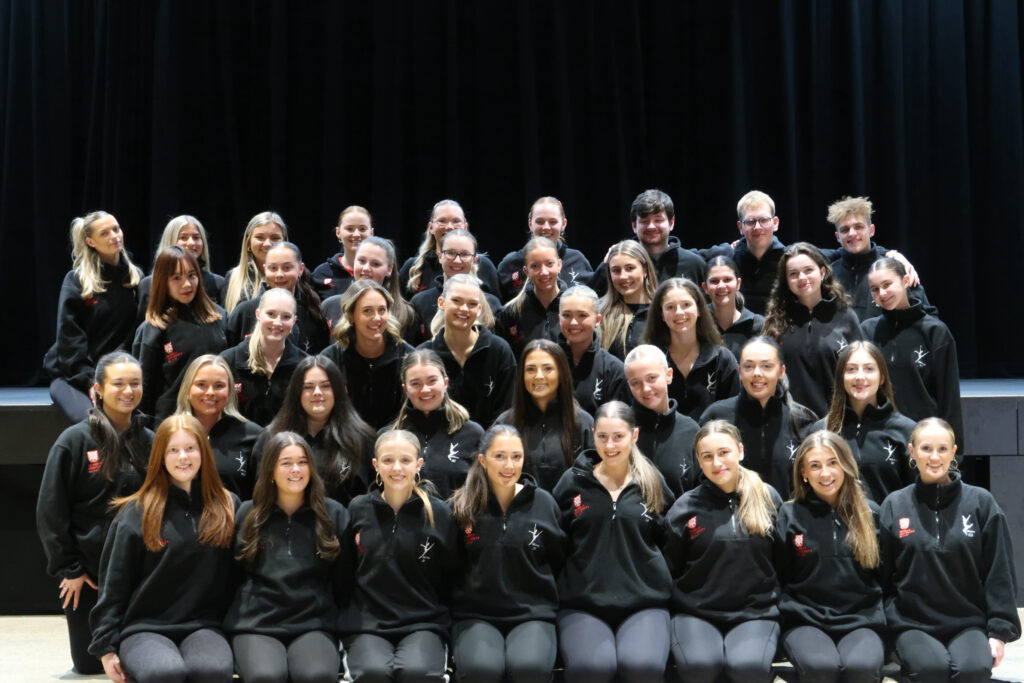
Age, nationality, and background melted away the moment we stepped into the Blue Sky Room or onto the stage of Mandela Hall. During competitions in Leeds and Liverpool, when I received applause and compliments from competitors and audience members, I felt great joy — not just personally, but as a proud representative of Chinese and Asian women. We are strong, resilient, and accomplished, and I believe we should be brave in showing that to the world in every arena we enter.
After the competition season, our hip-hop team was also invited to perform at Queen’s Annual Fashion Show and the QUB Dance Annual Showcase. I made every effort to participate in all the events I could, and in doing so, I learned not only new choreography and performance skills but also valuable lessons about resilience, teamwork, and self-discovery.
If you love dancing, or simply want to try something new, I wholeheartedly encourage you to join a club or society at Queen’s. You never know what amazing experiences and friendships are waiting for you to explore and enjoy!
Related links
The UN celebrates Chinese Language Day annually on 20th April each year. This year, it falls on to a Sunday.
The date for the Chinese day was selected from Guyu (“Rain of Millet”), which is the 6th of 24 solar terms in the traditional East Asian calendars, to pay tribute to Cangjie. Cangjie is a very important figure in ancient China, claimed to be an official historian of the Yellow Emperor and the inventor of Chinese characters. Legend has it that he had four eyes and four pupils, and that when he invented the characters, the deities and ghosts cried and the sky rained millet. From then on, Chinese people celebrate the day Guyu in honour of Cangjie. In the Gregorian calendar, it usually begins around April 20.
To mark this special occasion, we warmly invite everyone with a passion for promoting the Chinese language and culture worldwide—whether in academic or professional settings, as teachers or learners—to join us for the UN Chinese Language Day Forum 2025.
Our two invited speakers will share their insights and reflections drawn from years of experience in intercultural workplaces, offering valuable perspectives on both academic and professional practices in a global context.
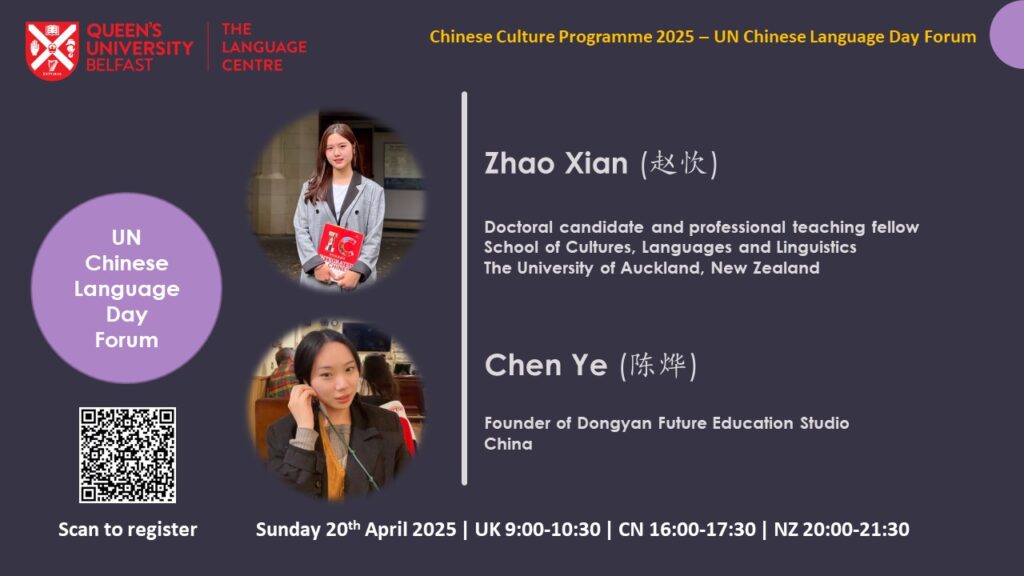
Speakers:
Xian ZHAO (赵忺) is a doctoral candidate and Professional Teaching Fellow in the School of Cultures, Languages, and Linguistics at the Faculty of Arts, University of Auckland. With a strong passion for Chinese language education, she brings extensive teaching experience across diverse cultural and academic settings, including China, the United States, Thailand, and New Zealand.
In 2019, she served as a Chinese language lecturer in the Department of East Asian Studies at Princeton University. Prior to that, she taught at Confucius Institutes in both Thailand and the U.S., where she was actively involved in language instruction and cross-cultural exchange. Her professional contributions extend beyond the classroom—she has served as an examiner for the selection of Confucius Institute volunteer teachers and for the CTCSOL certificate (Certificate for Teachers of Chinese to Speakers of Other Languages).
Additionally, she has acted as a judge for the Chinese Bridge competition. Currently, her research interests lie at the intersection of individual learner differences, artificial intelligence, and language teaching. She is particularly interested in how emerging technologies can enhance the learning experience and outcomes for second language (L2) learners. Xian has published her work in several top-tier academic journals such as Studies in Second Language Acquisition, System, and Language Teaching Research, among others. She also serves as a peer reviewer for more than 20 academic journals.
Ye CHEN (陈烨) is Founder of Dongyan Future Education Studio. She was a former dispatched Mandarin teacher at the Confucius Institute of Peking University and UCL. In 2023 she was named the Global Digital Gold Medal Lecturer by the Chinese Language Alliance, and in 2024 she received the Chinese Language Alliance Gold Medal for Digital Resource Application Case Study (PBL Teaching Method).
Ye has taught at UCL Academy and Seoul International School and served as a member of the question-setting committee for Korea’s Chinese College Entrance Exam mock tests (2021). She took a Chief Research Editor role in the development of an innovative vocabulary software project under Center for Language Education and Cooperation’s (CLEC, China) resource development initiative. Ye has been invited multiple times to conduct training for overseas volunteer Mandarin teachers of CLEC, as well as Chinese teacher associations in Canada, the UK, and South Korea, training over 3,000 teachers in total. Her research has been presented at international conferences, including the European Association of Chinese Teachers’ Symposium, and she has been invited to deliver lectures on AI-empowered education at the Confucius Institutes of the London School of Economics and the University of Groningen in the Netherlands.
Registration
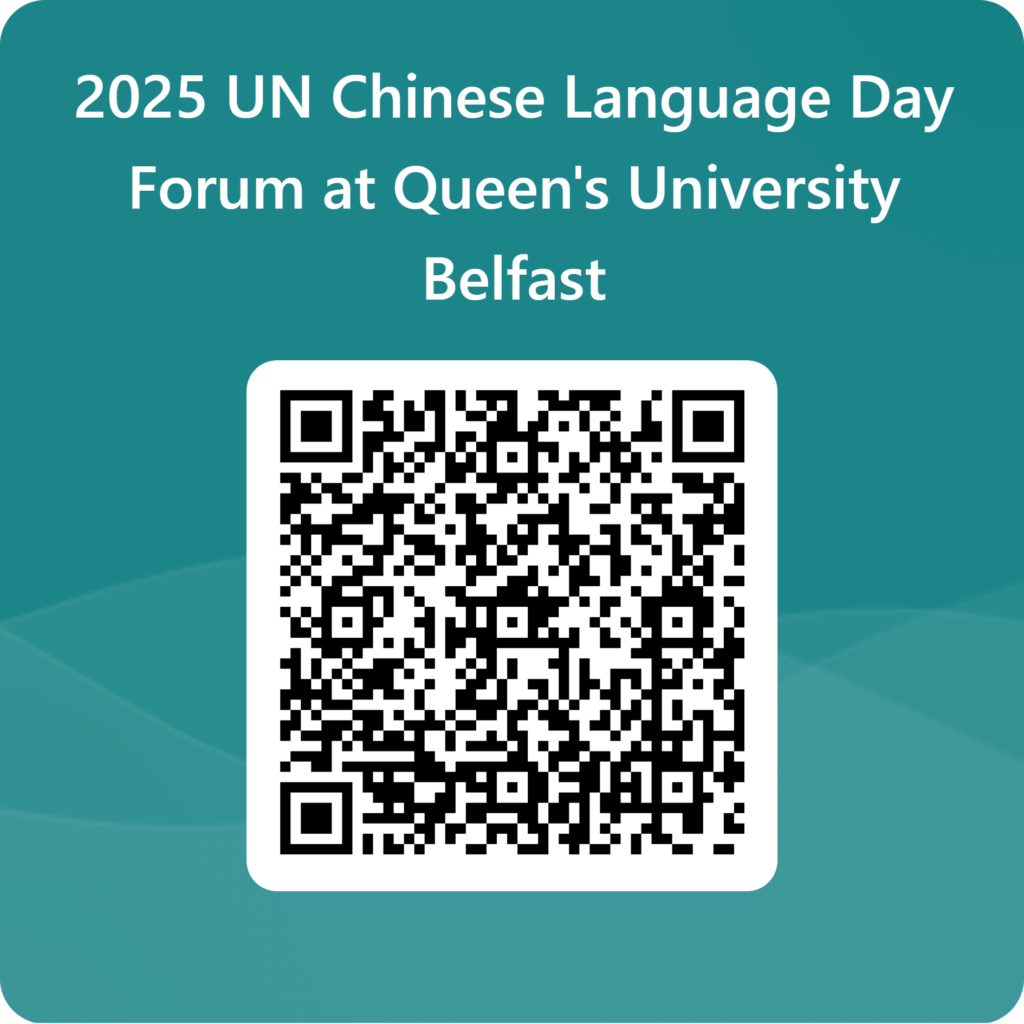
Date: Sunday 20th April 2025
Time: UK 09:00-10:30 | CN 16:00-17:30 | NZ 20:00-21:30
Access: QUB MS Teams (link will be given after registration)
Languages: Chinese, with English
With the arrival of spring, Chinese scholars are showcasing their vibrant academic contributions. This April, Queen’s University is excited to present two engaging talks on Chinese culture.
Talk 1
For this Friday’s History Seminar, PhD student Ziheng Wang from School of History, Anthropology, Philosophy and Politics presents his research work titled ‘The Apple of My Eye: The Chinese Depiction towards Russia since the 1990s’.
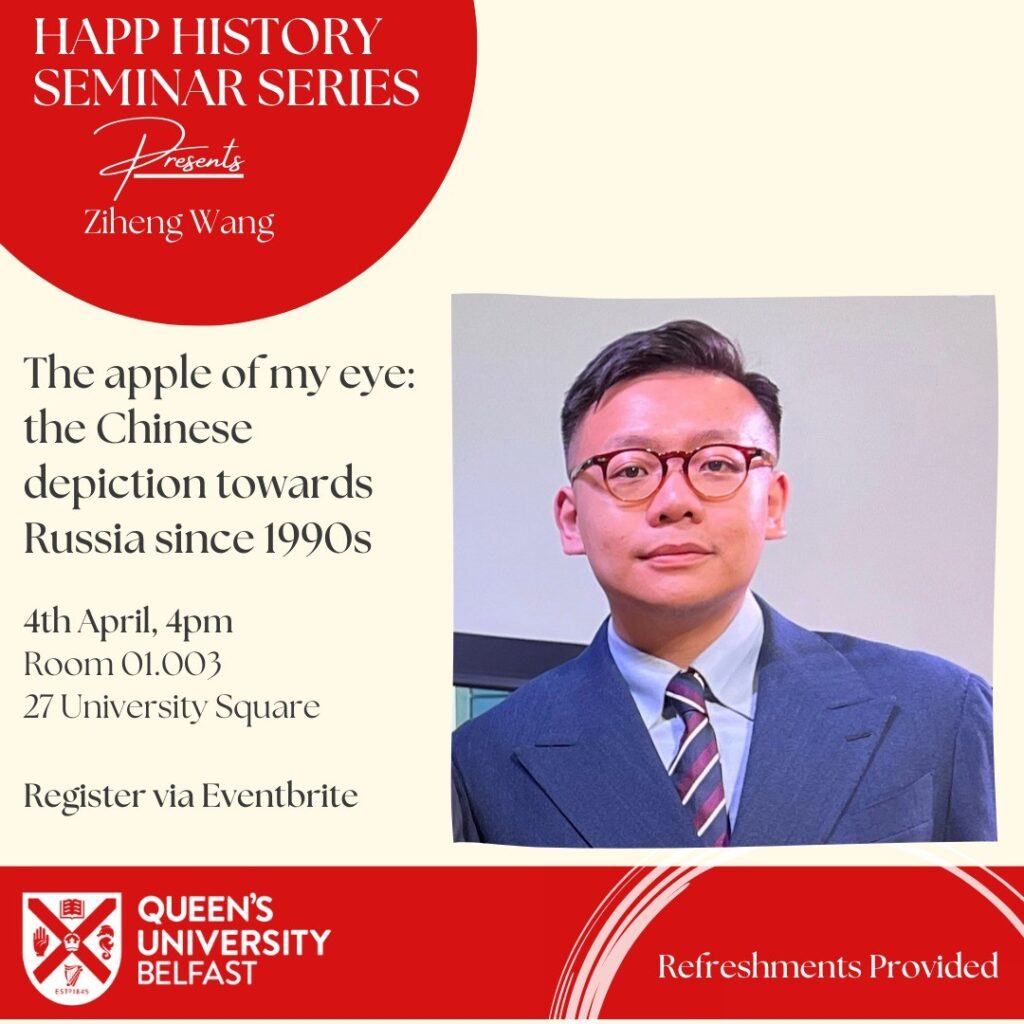
All welcome, refreshments provided!
Talk 2
In the following Friday, Chinese tutor Heng Wang from QUB Language Centre will present an introduction on how Islam has developed in China since 7th century, and how it has intertwined with local culture and religions.
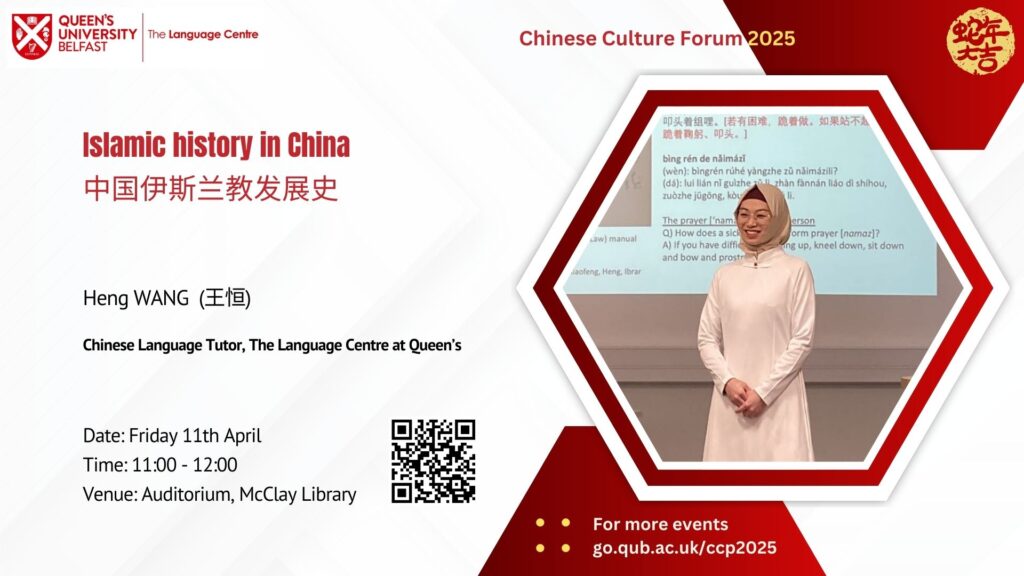
For more information and registration, read the post below:
Wish you all a happy and productive April!
The School of History, Anthropology, Philosophy and Politics has announced its Spring Dialogues to welcome a cohort of their students and alumni to share their research work at the Seminar Series, with Liang HE, a Chinese graduate in Philosophy, being the first one on its programme.
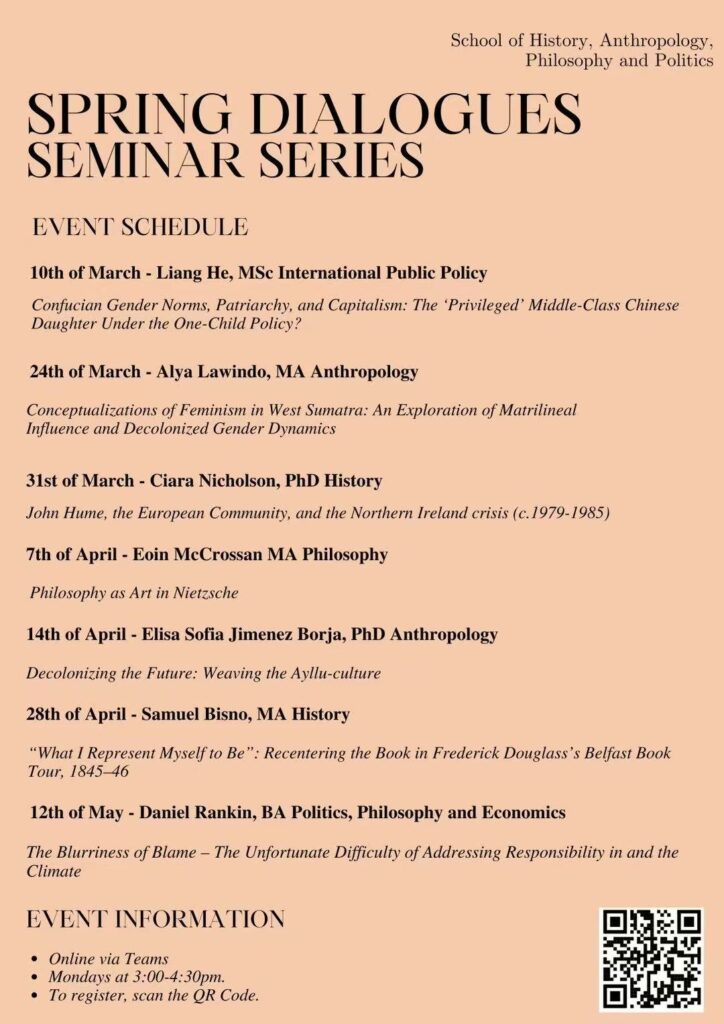
Liang has kindly shared her presentation information and abstract with our Chinese Culture Forum as below. She also would like to extend her invitation to all those who are interested in the topic.
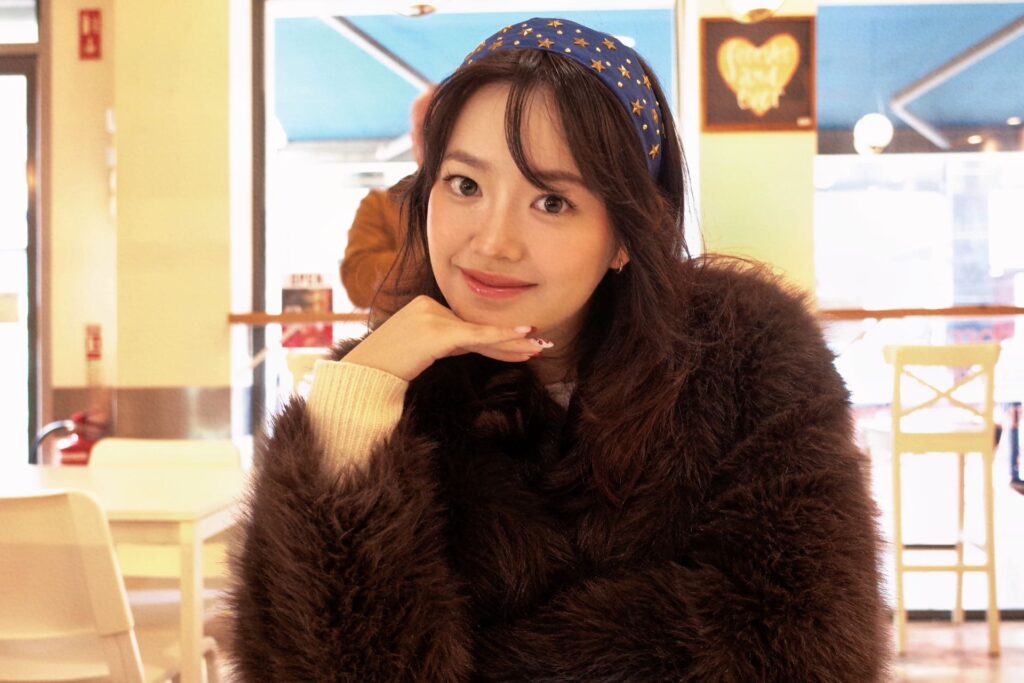
Speaker: Liang HE, MSc International Public Policy
Abstract
Confucian Gender Norms, Patriarchy, and Capitalism: The ‘Privileged’ Middle-Class Chinese Daughter Under the One-Child Policy?
The one-child policy, enacted in China from the 1970s to 2015, has profoundly shaped the
experiences of urban women, particularly the daughters of the emerging middle class. Rooted in Confucian gender norms and reinforced by a patriarchal system, this policy has contributed to societal expectations that prioritize male offspring while simultaneously offering urban women increased access to resources and opportunities. As a result, these “privileged daughters” are often viewed as beneficiaries of urbanization and economic growth.
This paper employs Marxist feminist theory to explore the lives of Chinese middle-class daughters studying in the West. It examines the conflicting pressures they face between traditional gender roles – emphasizing marriage, motherhood, and filial piety – and the aspirations encouraged by a neoliberal environment. These women navigate a complex landscape where they must reconcile their pursuit of autonomy with societal expectations to provide for their families and uphold cultural traditions. By highlighting the experiences of these urban daughters, this research sheds light on how Confucian gender norms and capitalism intersect, revealing the challenges they encounter in balancing personal desires with familial obligations. Ultimately, this paper enhances our understanding of how the intersection of gender norms and capitalist structures shapes the experiences of urban middle-class daughters in contemporary China, revealing the complexities of their identities and the societal expectations they must navigate.
Date: 21 March 2025
Time: 11:00 – 14:00
Venue: Lecture Room 1, Riddel Hall, QUB
Organisers:
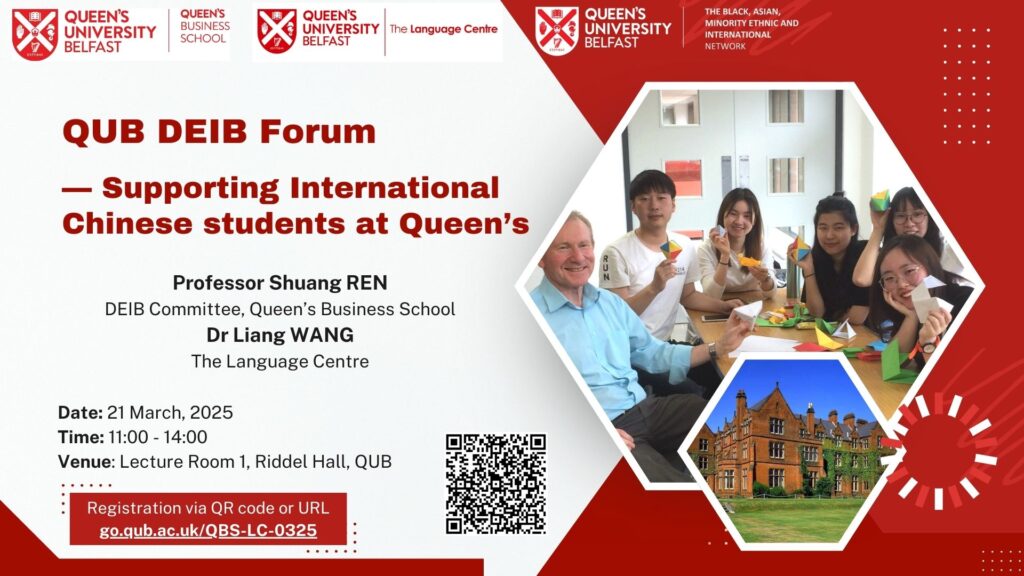
Outline:
This forum aims to discuss the local resources, good practices and challenges when supporting Chinese (and other) international students, in response to the recently published HEPI Report “How can UK universities improve their strategies for tackling integration challenges among Chinese students?“ (Ebel, 2024). This report raises critical questions about whether Chinese students receive adequate support in UK universities.
As one of the UK’s leading institutions for international students, Queen’s University Belfast is committed to fostering a welcoming and inclusive environment for Chinese and other international students. Jointly organised by QBS DEIB Committee and The Language Centre, supported by QUB iRise Network, we particularly welcome colleagues from different sectors with good experiences of supporting Chinese students to attend the discussions. Based on the voices from staff and students at the forum, we hope to identity approaches that would enhance the level of support at Queen’s University Belfast.
Below is a provisional agenda for your information:
Places are limited to max. 30 due to room capacity and we have the first-come, first-served policy. The registration form will be closed once places are taken, or by 5 pm, Thursday 20th March the latest.
As the Lantern Festival falls on Wednesday, 12th February, we would like to take this opportunity to extend our heartfelt thanks to all colleagues and students who have supported our celebration programme in various ways.
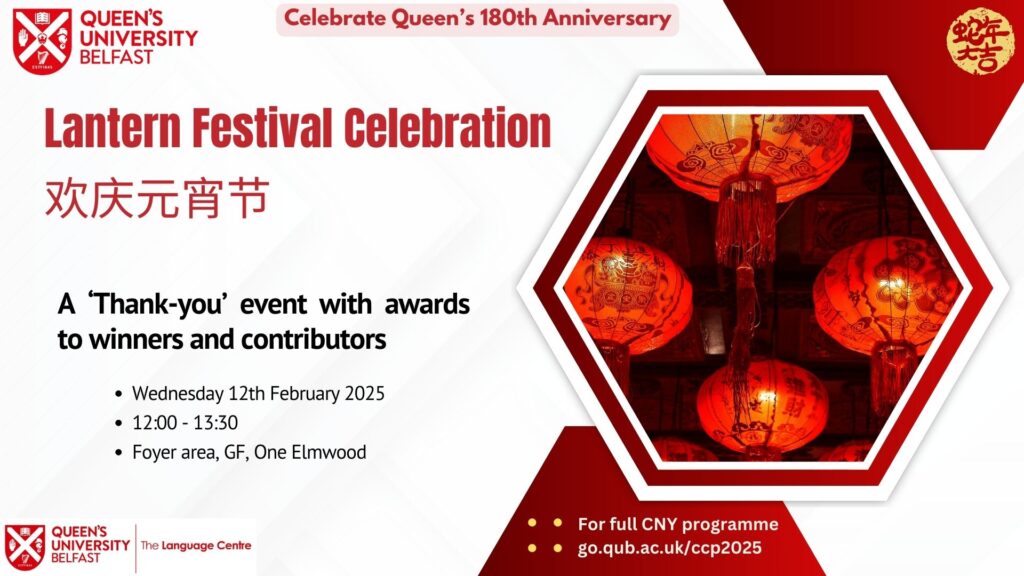
To mark the conclusion of the Year of the Snake Celebration Programme, recognise the winners of the Drawing the Snake Competition, and express our gratitude to our volunteers and contributors, we warmly invite you to our “Lantern Festival” stands in the foyer area of One Elmwood on Wednesday, 12th February, from 12:30 to 13:30. Join us for a special gathering and award ceremony, where we will celebrate your contributions, share joyful moments, and reflect on the unforgettable highlights of this year’s festivities.
As part of our celebration tradition, we host a Table Tennis Event around the Lantern Festival to promote networking and community building as a key highlight of the Lantern Festival celebration. Sponsored by the QUB iRISE Staff Network, this event warmly invites students, staff members, and their families to take part in a fun and friendly gathering. It offers a chance to engage with one of the most popular sports in Chinese communities while also fostering well-being through physical activity and social interaction.
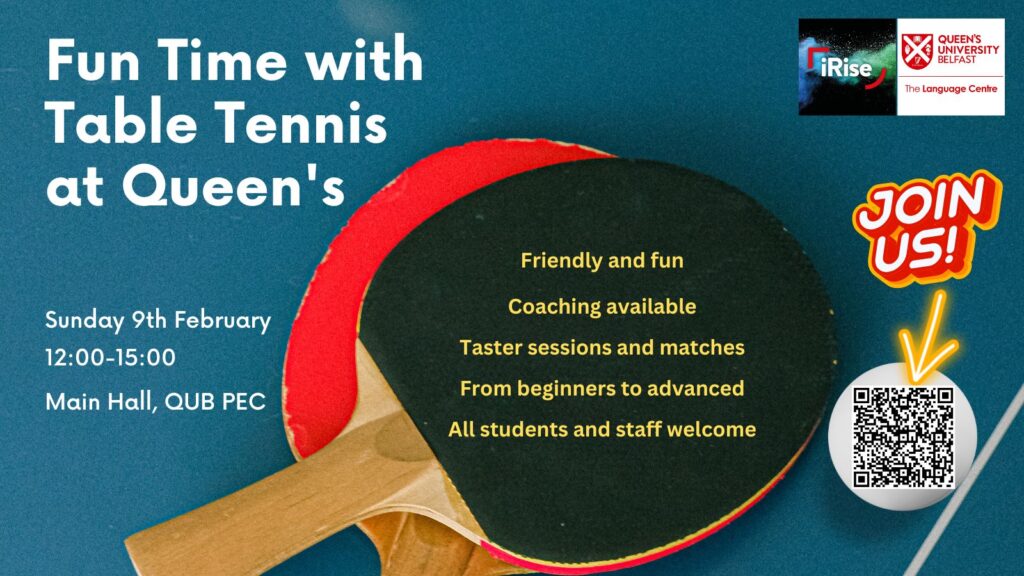
Additionally, we invite you to explore the ArtEast Online Exhibition, showcasing a diverse collection of artworks by local Chinese artists. The artists would love to hear your thoughts and suggestions to further enhance their presentations.
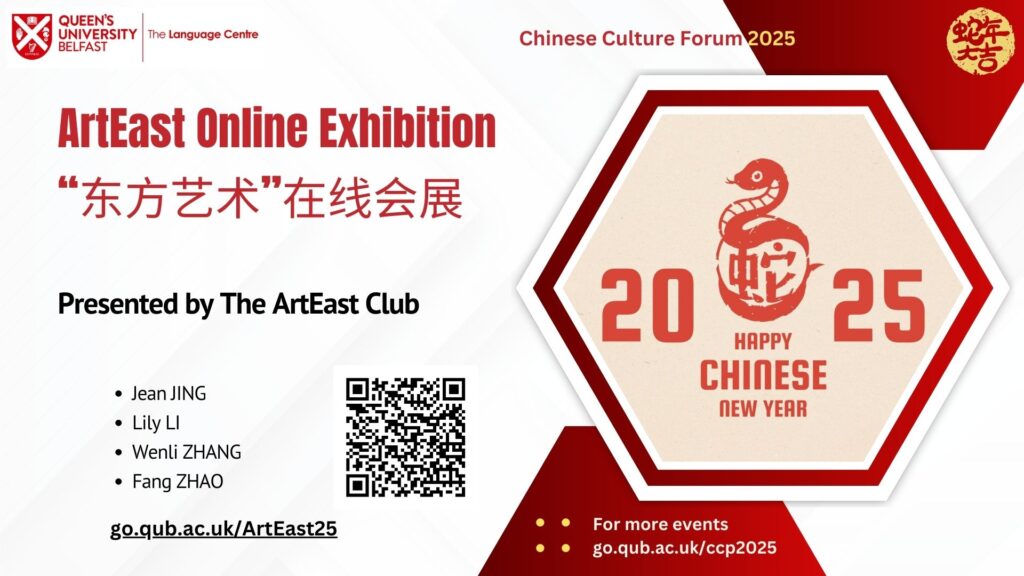
Thank you for your enthusiastic participation! While our Chinese Culture Forum 2025 will continue to present events and activities in the future, we look forward to celebrating with you again next year as we welcome the Year of the Horse!